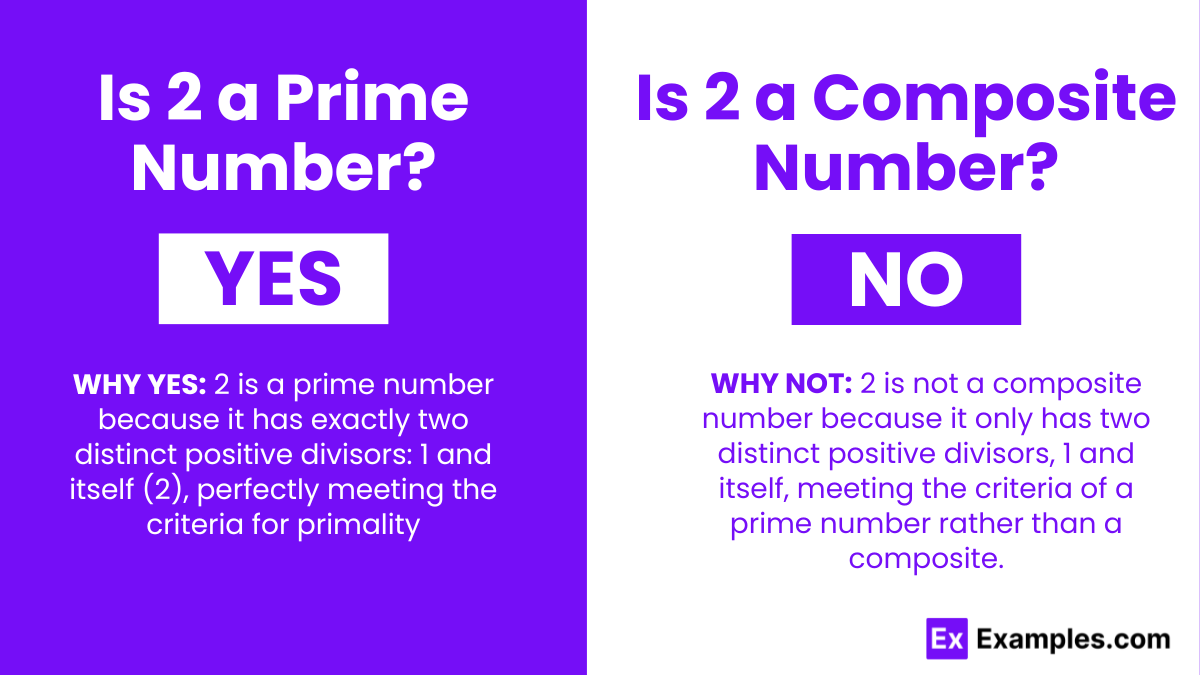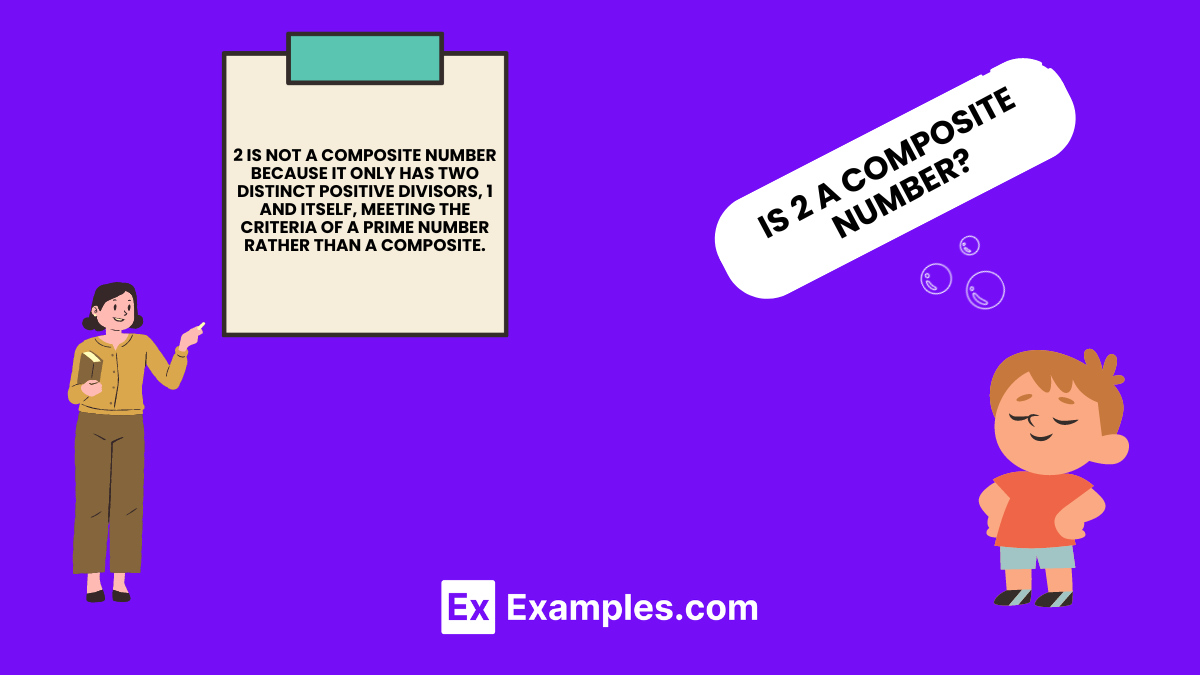Is the number 2 a prime number or a composite number?
Prime
Composite
Neither
Both


Yes – 2 is a Prime Number
Why Yes: 2 is a prime number because it has exactly two distinct positive divisors: 1 and itself (2), perfectly meeting the criteria for primality.
NO – 2 is not a Composite Number
Why not: 2 is not a composite number because it only has two distinct positive divisors, 1 and itself, meeting the criteria of a prime number rather than a composite.

To determine if 2 is a prime or composite number, examine its divisors. Since 2 has exactly two distinct positive divisors, 1 and itself, it is classified as a prime number.
| Property | Answer |
|---|---|
| Is 2 a prime number? | Yes |
| Is 2 a composite number? | No |
| Is 2 a perfect square? | No |
| Factors of 2 | 1, 2 |
| Multiples of 2 | 2, 4, 6, 8, 10, 12, 14, 16, 18, 20 |
| Cube Root of 2 | No (cube root of 2 is not an integer) |
| Square of 2 | 4 |
| Square Root of 2 | No (square root of 2 is irrational) |
| Is 2 a Perfect Square? | No |
| Is 2 a Perfect Cube? | No |
| Is 2 an Irrational number | No |
| Is 2 a Rational number | Yes |
| Is 2 a Real number | Yes |
| Is 2 an Integer | Yes |
| Is 2 a Natural number | Yes |
| Is 2 a Whole number | Yes |
| Is 2 an Even or odd number | Yes (2 is an even number) |
| Is 2 an Ordinal number | Yes |
| Is 2 a Complex number | Yes |
Below are some of the categories in which number 2 falls:
2 is not only the smallest prime number but also the only even prime number. This dual distinction highlights its unique position in the realm of mathematics. All other even numbers can be divided by 2, thereby having at least three divisors, which disqualifies them from being prime. The number 2, however, remains the sole exception to this rule, making it a subject of fascination and study. Its status as the smallest and only even prime number underscores the intrinsic beauty and symmetry of mathematical concepts, offering insights into the orderly structure that governs the universe of numbers.
The factors of 2 are 1 and 2 itself. Factors are numbers that can be multiplied together to get the original number. Since 2 is a prime number, its only factors are 1 (which is a universal factor for all numbers) and 2 (since it can only be divided evenly by 1 and itself).
1. What makes 2 a prime number?
2 is considered a prime number because it meets the fundamental criteria for primality: it has exactly two distinct positive divisors, which are 1 and itself.
2. Why is 2 unique among prime numbers?
2 is unique among prime numbers because it is the only even prime number. All other even numbers are divisible by 2, making them composite.
3. Are there any mathematical patterns involving the number 2 as a prime number?
Yes, 2 is part of several mathematical patterns involving prime numbers, including the sequence of prime numbers and its role in generating twin primes (pairs of prime numbers that are two units apart, like (3, 5) where 2 is the difference).
4. Can 2 be classified as a composite number?
No, 2 cannot be classified as a composite number. Composite numbers have more than two divisors, whereas 2 only has two, aligning it with the definition of a prime number.
5. Is 2 the only even prime number?
Yes, 2 is the only even prime number. All other even numbers can be divided by 2, making them have at least three divisors, which disqualifies them as prime numbers.
2 is classified as a prime number because it has exactly two distinct positive divisors: 1 and itself. It does not qualify as a composite number.
Text prompt
Add Tone
The Smallest and The Only Even Prime Number!
Problem Statements
Is the number 2 a prime number or a composite number?
Prime
Composite
Neither
Both
Which description best fits the number 2?
Prime Number
Composite Number
Even Number
Odd Number
What term is used to describe the number 2 in number theory?
Composite
Non-prime
Undefined
Prime
How do mathematicians classify the number 2?
As a prime number
As a composite number
As an irrational number
As an even number
What is the classification of the number 2 in basic arithmetic?
Prime
Composite
Real
Imaginary
How should the number 2 be categorized in terms of prime numbers?
Composite
Prime
Neither
Fractional
Which option accurately describes the number 2 in the context of number types?
Non-composite
Decimal
Composite
Prime
What type of number is 2 according to number classification?
Prime Number
Composite Number
Even Integer
Odd Integer
Which term correctly describes the number 2 in number theory?
Infinite
Zero
Prime
Composite
What is the fundamental characteristic of the number 2 that determines if it is a prime number?
It is divisible by 1 and itself only.
It is divisible by more than two numbers.
It is an even number only.
It is an odd number.
Before you leave, take our quick quiz to enhance your learning!

